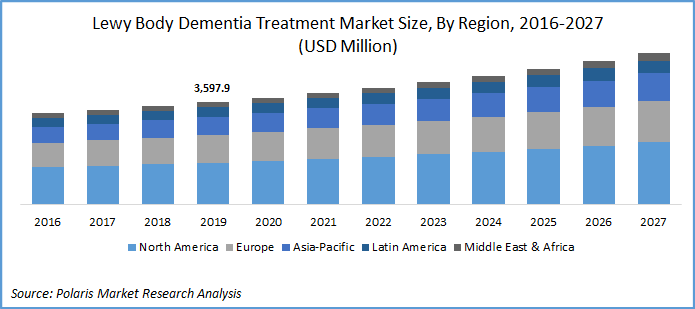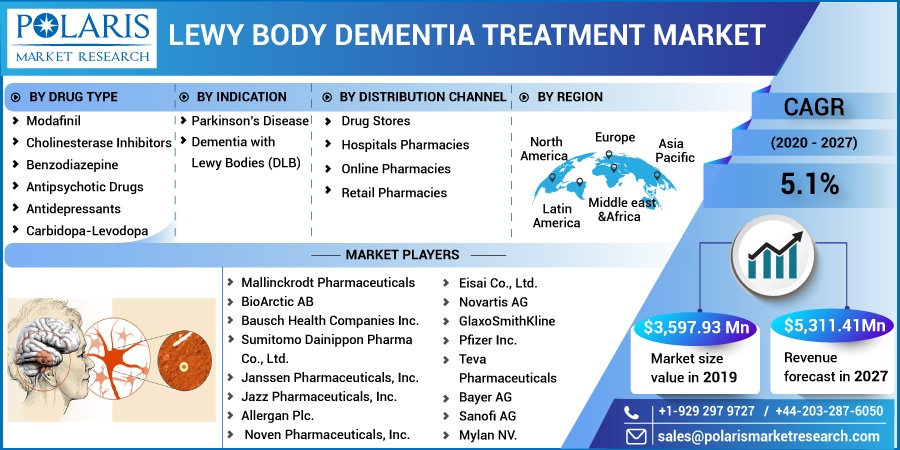
Lewy Body Dementia Treatment Market Share, Size, Trends, Industry Analysis Report, By Drug Type (Modafinil, Cholinesterase Inhibitors, Benzodiazepine, Antipsychotic Drugs, Anti-depressants, and Carbidopa-Levodopa); By Indication [Parkinson’s Disease and Dementia with Lewy Bodies (DLB)]; By Distribution Channel; By Regions Segment Forecast, 2020 - 2027
- Published Date:Dec-2020
- Pages: 112
- Format: PDF
- Report ID: PM1742
- Base Year: 2019
- Historical Data: 2016-2018
Report Outlook
The global Lewy body dementia treatment market was valued at USD 3,597.93 million in 2019 and is expected to reach USD 5,311.41 million by 2027, growing at a CAGR of 5.08% during 2020-2027. The market factors attributed to the market growth are a rise in the geriatric population across the world, exposure to carcinogenic pollutants causing mutation in the onset of Lewy body deposition i.e.; intracellular alpha-synuclein, on-going industry-academia collaboration, and the people with a genetic history of dementia.
Lewy body dementia is most common, after Alzheimer’s disease. Lewy body dementia usually happens to people over the age of 50 or above. Lewy body dementia is a growing disease, which starts with mild symptoms and gets worse over time. The disease is prolonged for 5 to 8 years till death from the time of diagnosis, but the duration of the disease can range from 2 to 20 years. The rising conditions of brain-related diseases among the population are anticipated to drive demand.

Know more about this report: request for sample pages
Industry Dynamics
Growth Drivers
Lewy body dementia treatment market is anticipated to witness significant growth owing to the increasing approvals & clearance of the clinical trials and studies of the drugs for the treatment of the Lewy body dementia disease. The rising prevalence of brain-related disorders has uplifted the need for effective treatment and therefore has led to market growth. For instance, in August 2020, Eli Lilly and Company has completed the clinical study of LY3154207 in patients suffering from Lewy Body Dementia (LBD) or Idiopathic Parkinson's Disease (PD). The rising awareness pertaining to dementia to prevent the risk of damage to the central nervous system and body movement has led to the growing demand for the Lewy body dementia treatment market. The growing approval for the medical drugs associated with Lewy body dementia is expected to increase the demand for the global market.
 Know more about this report: request for sample pages
Know more about this report: request for sample pages
A rise in the initiatives taken by the market players such as developing new methods, drugs, and the issue of patents to manufacture new methods is anticipated to foster the growth of the global market. For instance, in February 2020, a clinical-stage drug platform company, Annovis Bio Inc. issued a patent (US 10,383,851) for developing a method to address Lewy Body Dementia and Parkinson’s disease.
Lewy Body Dementia Treatment Market Report Scope
The market is primarily segmented on the basis of drug type, indication, distribution channel, and geographic region.
|
By Drug Type |
By Indication |
By Distribution Channel |
By Regions |
|
|
|
|
Know more about this report: request for sample pages
Insight by Drug Type
On the basis of drug type, the global market is divided into modafinil, cholinesterase inhibitors, benzodiazepine, antipsychotic drugs, antidepressants, and carbidopa-levodopa. On focusing on drug type, the cholinesterase inhibitors segment holds the most dominant share of the global market. The antipsychotic drugs segment has been accounted for witnessing the second-largest share of the global market. The dominance of the segments in the global market is attributed to their minimal side effects during the treatment of the patients.
Insight by Indication
On the basis of indication, the global market is bifurcated into Parkinson's disease and dementia with Lewy bodies. The segment DLB (Dementia with Lewy Body) is the second most prevailing disorder after Alzheimer’s dementia in the population. The segment of Parkinson's disease has been proved to turnout the rapid growing disease with the central nervous system disorder and other symptoms such as stiffness, loss of balance, and slow movement. The indication segment of the global market is rapidly growing due to the rising cases of dementia disorder.
Insight by Distribution Channel
On the basis of the distribution channel, the market is segmented into drug stores, hospital pharmacies, online pharmacies, and retail pharmacies. The hospital segment is expected to hold the major revenue share of the global market due to the high usage of the drugs, medications, etc. at hospitals, associated with dementia treatment. The online pharmacies segment accounted to witness the lucrative growth followed by the retail pharmacies and drug stores due to the rising incidence and growing awareness of an individual for dementia treatment. It is also expected to drive the demand for channel segments and a subsequent surge in the global market.
Geographic Overview
North America is expected to witness significant growth owing to the high incidences of dementia disease in the region. The growing geriatric population of the region is one of the main factors to influence the demand for the global market due to the risk of getting affected with the Lewy body dementia disorder. For instance, in February 2019, BioArctic AB, a Swedish research-based biopharma company, declared that AbbVie has received approval from the U.S. Food and Drug Administration of IND application for ABBV-0805 to address the patients suffering from Lewy body dementia and Parkinson’s disease. The key players in the market have adopted acquisition as a strategy to expand their regional presence. For instance, in January 2019, Takeda Pharmaceutical Company Limited acquired Shire plc. This acquisition has shifted Takeda Pharmaceutical to become a leading global player in the biopharmaceutical industry in Japan and influenced the demand in Asia Pacific.
Competitive Insight
The key players in the market are focusing on increasing their market share by adopting strategies such as regional expansions, entering partnerships & joint ventures, and mergers & acquisitions. For instance, in August 2020, a Japan-based pharmaceutical company, Sumitomo Dainippon Pharma Co., Ltd., entered into a joint research agreement with Aikomi, Ltd. to manufacture and develop medical devices to provide effective & safe treatment and prevent psychological and behavioral symptoms.
Some of the major players operating in the market include Mallinckrodt Pharmaceuticals, BioArctic AB, Bausch Health Companies Inc., Sumitomo Dainippon Pharma Co., Ltd., Janssen Pharmaceuticals, Inc., Jazz Pharmaceuticals, Inc., Allergan Plc., Noven Pharmaceuticals, Inc., Takeda Pharmaceutical Company Ltd., Eli Lilly and Company, Eisai Co., Ltd., Novartis AG, GlaxoSmithKline, Pfizer Inc., Teva Pharmaceuticals, Bayer AG, Sanofi AG, and Mylan NV.
